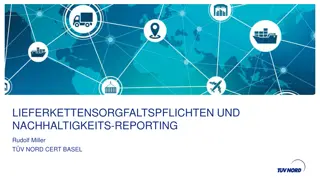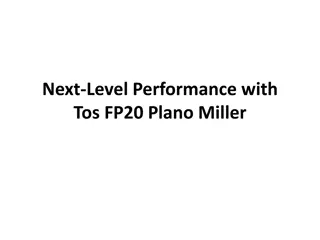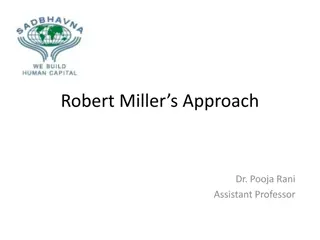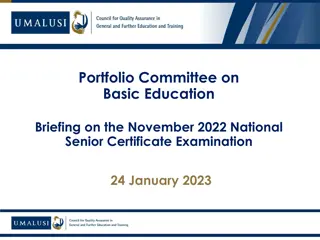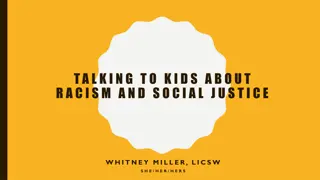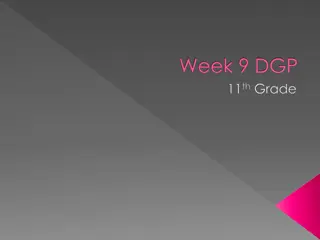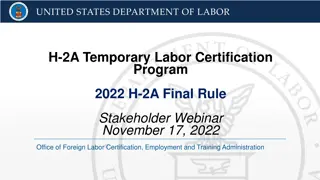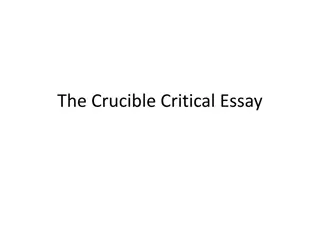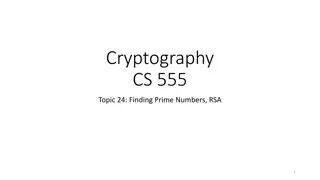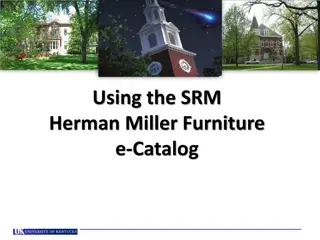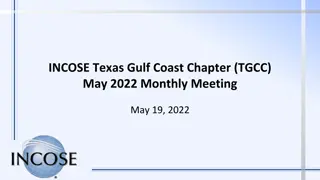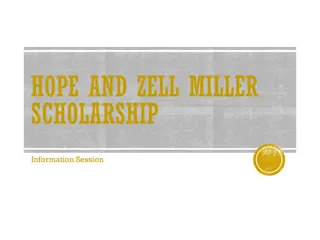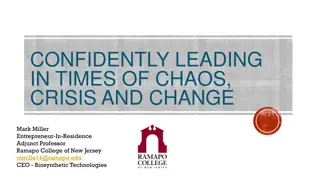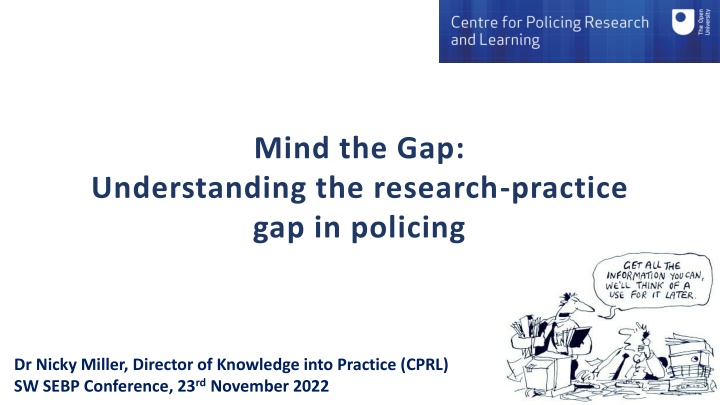
Understanding the Research-Practice Gap in Policing
Explore the challenges and solutions related to the research-practice gap in policing, focusing on evidence-based practices, attitudes towards research, and factors influencing the implementation of research findings into police operations. The discussion covers the importance of professionalization agendas, knowledge mobilization interventions, and the balance between research and professional experience in informing police practices.
Download Presentation

Please find below an Image/Link to download the presentation.
The content on the website is provided AS IS for your information and personal use only. It may not be sold, licensed, or shared on other websites without obtaining consent from the author. If you encounter any issues during the download, it is possible that the publisher has removed the file from their server.
You are allowed to download the files provided on this website for personal or commercial use, subject to the condition that they are used lawfully. All files are the property of their respective owners.
The content on the website is provided AS IS for your information and personal use only. It may not be sold, licensed, or shared on other websites without obtaining consent from the author.
E N D
Presentation Transcript
Mind the Gap: Understanding the research-practice gap in policing Dr Nicky Miller, Director of Knowledge into Practice (CPRL) SW SEBP Conference, 23rd November 2022 1
Drivers for Research Professionalisation agenda with focus on evidence-based practice as part of the national curriculum for new recruits EBP is about the creation, sharing and use of the best available evidence to inform and challenge policing policies, practices and decisions (College of Policing, 2014) 32% of social science academic research is never cited (Remler, 2016) It takes 17 years for 14% of research to be implemented into practice (Balas, 2000) Research Practice Research-Practice gap is not unique to policing but covers many professions (e.g. Bansal et al., 2012; Leach & Tucker, 2016) Multiple studies report positive attitudes to research in a policing context but the research practice gap cannot be achieved by understanding attitudes alone (e.g. Telep, 2017; Fleming, 2017; Lumsden & Jackie, 2018; Kalyal, 2019)
Research into Practice and Practice into Research? Examining how research evidence is generated, disseminated and used by policing partners Surveys Exploring the role & impact of the CPRL in supporting & mobilising the use of research evidence into policing & academic practice Focus groups Identifying the individual and organisational factors that support or hinder research use within the CPRL and by policing partners Interviews Mapping Kmob. Assessing effectiveness of the different knowledge mobilisation interventions used by the CPRL to promote and support the use of its research into practice
Police Practice should be informed by: 31% 11% 52% 50:50 split between research and professional experience 25:75 split in favour of professional experience 75:25 split in favour of research Based on Responses to Police Survey
Receptivity to research? Personal attitudes Research is important to policing I would change my ways based upon research Research helps to build a scientific base for policing Organisational Behavioural Intention I will use research to inform Subjective norms My peers dismiss research I m not encouraged to use research in my decision making Behaviour I use research to inform my tactics Individual Individual my next problem solving plan Perceived behavioural control I would use research if I had to evidence it in my PDR Theory of Planned Behaviour, Ajzen 1991
Barriers to Research Use Communication Organisational Research Individual Insufficient time on the job to implement new ideas Inadequate resources to support the translation of research into practice Not enough time to read research No authority to change practice Research results are not generalisable to local context Senior leaders not supportive of implementation of research to practice Supervisors will not cooperate with implementation of research to practice Police unaware of research Police isolated from knowledgeable colleagues with whom to discuss research There is not a documented need to change practice through research Police do not feel capable of evaluating the quality of research Police are unwilling to change or try new ideas Police see little benefit for themselves in research use Police do not see the value of research to practice ) Experience of collaborative research with police Consideration of useful products to inform ways of working at outset of research process 67% Research reports are not published fast enough Research is not replicated Research reports contain conflicting results Research has methodological inadequacies Conclusions drawn from research are not justified It is hard to believe the results from research ) Experience of collaborative research with police Consideration of useful products to inform ways of working at outset of research process 51% Research is not readily available Research is not reported clearly Relevant literature is not compiled in one place Statistical analyses are not understandable Findings from research are not relevant to practice ) Experience of collaborative research with police of research process 68% 52% 69% 65.5% 61% 48% 58% 51% ) Experience of collaborative research with police Consideration of useful products to inform ways of working at outset of research process Adapted from the Barriers Survey, Funk et al, 1991
Thematic analysis of barriers We re constantly chasing the curve so in reality most people probably are too busy trying to get the job done to engage in any research. We re too busy reacting to do any planning Lack of resources The professional expertise and the credibility of being a practitioner based in a force always seems to take precedent over academic research which is the problem that a lot of us have in trying to embed research into practice" Credibility of research evidence Police officers often aren t aware of the research being conducted and academic research and language is often not compatible with policing vernacular Accessibility Barriers senior leaders need to be held to account for not supporting or understanding research an inability to adapt or alter current culture & suspicion of those conducting research it is research for research s sake, research for promotion Senior Leadership Police Culture Research into Practice I don t think that they have the confidence to recognise good research and/or challenge bad research Research is done and never put into practice Capability
Intervention Mechanisms Awareness - building awareness and positive attitudes towards research evidence use Agreement - building mutual understanding and agreement on police relevant questions Access & Communication - Providing communication of and access to research evidence Interaction - Facilitating interactions between decision-makers and researchers Skills - developing the skills to access and make sense of research evidence Structure & processes - influencing decision- making structures and processes Langer et al., 2016
Research into practice interventions Awareness Mechanisms Named EBP leads who promote research evidence through alerts, portals and emails 01 01 02 03 04 05 06 07 EBP and research evidence not a priority for many forces Structure & Interaction Communication Process Placeholder Awareness Awareness Access & Agree Use Evidence Champions, PCDA students, internal sponsors, senior leadership to actively promote research and encourage its use. Host force research exhibitions showing impact; workshop demonstrations Consider researchers in residence Skills
Research into practice interventions Agree Mechanisms Partnerships between forces & academia EBP Boards with academic reps Reactive to research requests, usually driven by academics Force research portfolios very broad Cooperating rather than collaborating 01 01 02 03 04 05 06 07 Structure & Interaction Communication Process Placeholder Awareness Awareness Access & Agree Skills Explore ways to narrow down force research portfolio to enable key knowledge gaps to be filled AND to operationalize research Proactive horizon scanning to inform research portfolio Collaborate with researchers
Research into practice interventions Access & Communication Mechanisms Targeted emails (segmentation) Research repositories Use of available national resources EBP Champions Range of products from research briefing papers; posters; infographics 01 01 02 03 04 05 06 07 Inconsistent / ad hoc communications Provide opportunities but no tracking of engagement and impact Structure & Interaction Communication Process Placeholder Awareness Awareness Access & Agree Skills Develop mix of online, hybrid and F2F events that include regular, frequent and bite sized sessions Work with researchers to develop actionable messages from research Consider a suite of pull interventions
Research into practice interventions Interaction Mechanisms Work with academia to produce research Opportunities for interaction through SEBP, Knowledge Hub, CPRL etc. Internal links with L&D and POP teams (although inconsistent) Attendance at networking events (online and F2F) but limited follow up 01 01 02 03 04 05 06 07 Structure & Interaction Communication Process Placeholder Awareness Awareness Access & Agree Engage student officers & explore use of masters students Standing MOUs & data sharing Resident researchers & practitioner fellows Consider level/type of Force representation at partnership meetings Work across force departments Skills
Research into practice interventions Skills Mechanisms Research skills built into PCDA and demonstrated through Year 3 project Opportunities for senior level staff to develop research skills Lack of opportunities for development of research skills of other officers & staff 01 01 02 03 04 05 06 07 Structure & Interaction Communication Process Placeholder Awareness Awareness Access & Agree Skills Work with academic partners to develop research skills programme Lunch & Learn sessions
Research into practice interventions Structures & process Mechanisms EBP/Research Governance Boards Structures in place to co-ordinate and track research projects Senior leadership support (but varies) Lack of structures and process to monitor use & impact of research 01 01 02 03 04 05 06 07 Structure & Interaction Communication Process Placeholder Balance involvement against implementation Ensure processes & resources in place to translate & operationalise research Allocate an internal sponsor to combat Board ping pong Senior leaders to demonstrate behavioural norms Realise the impact of research Awareness Awareness Access & Agree Skills
Police-Academic partnerships as a success factor in bridging the gap? Knowledge Exchange & translation within and between academic and police partners Research Capacity Research Capability Research Direction Participation through partnership Mutual Benefits for Police, Academia & Society Knowledge into Practice Research Learning Learning Assurance Learning Accreditation Bespoke Learning Practice Evidence Practice Improvement
Any Questions? Nicky.Miller@open.ac.uk Melanie.Wiffin@btp.police.uk Debbie.kerridge@cambs.police.uk 18


